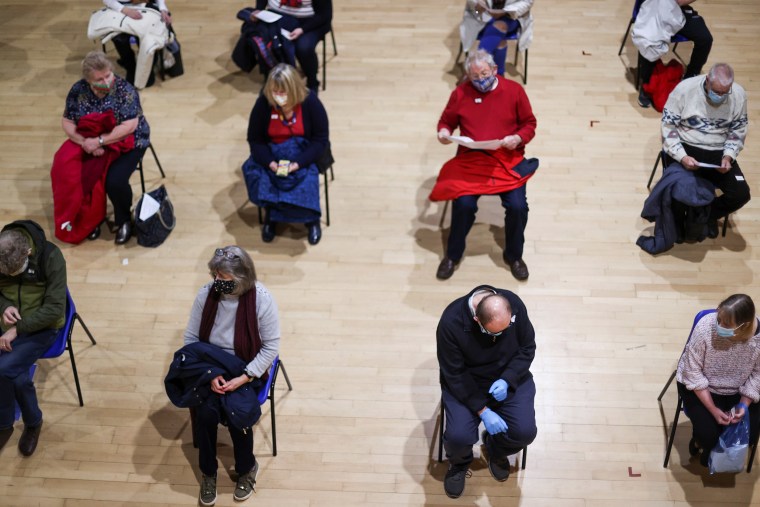LONDON — As the world races to vaccinate and fight new variants of Covid-19, a new trial is trying something that could speed up the process: mixing shots.
Patients taking part in a clinical trial launched Thursday in the United Kingdom will receive different vaccines for their first and second doses: the vaccine developed by Oxford University and AstraZeneca, followed by the one from Pfizer and BioNTech, or vice versa.
The U.K.'s Department of Health said it was the first study of its kind — normally patients receive two doses of the same vaccine — and will help determine the safety of mixing doses across different groups and with a variety of different time intervals.

The researchers said they wanted participants who were over 50 and had not yet been vaccinated to take part in the trial.
The 13-month study, known as "Com-Cov," is expected to first report initial findings in the summer. Its data could lead to a change in the U.K.'s vaccine policy.
In the U.S., the Centers for Disease Control and Prevention recently changed guidance for Covid-19 vaccines, saying that patients could mix the Moderna and Pfizer doses in "exceptional situations."
But the Pfizer and Moderna vaccines are both based on the same messenger RNA, or mRNA, platform. The U.K. trial, however, involves mixing vaccines based on different techniques. The AstraZeneca/Oxford vaccine uses an inactivated adenovirus, a type of virus that causes the common cold.
Download the NBC News app for breaking news and politics
Trial participants will be tested to monitor their levels of antibodies and T cells, which search for and attack infected cells.
"This is a hugely important clinical trial that will provide us with more vital evidence on the safety of these vaccines when used in different ways," said Nadhim Zahawi, the minister for Covid-19 vaccine deployment, in a statement.
Professor Jonathan Van-Tam, the U.K.'s deputy chief medical officer, who is ultimately responsible for the study, said there are "definite advantages to having data that could support a more flexible immunization program."
"It is also even possible that by combining vaccines, the immune response could be enhanced giving even higher antibody levels that last longer; unless this is evaluated in a clinical trial we just won’t know," he added.
The U.K. faced criticism for delaying the second vaccine dose for some patients by up to 12 weeks rather than the recommended 21 days, in order to prioritize administering as many first doses as possible.
But Health Secretary Matt Hancock this week pointed to new research, which is yet to be peer-reviewed, that suggests patients show high immune resistance to Covid and reduced transmission after just one dose.
Vaccine shortages and distribution problems have been reported across the United States, while many European Union nations are also receiving far fewer doses than expected.
The Oxford/AstraZeneca vaccine is not yet approved in the U.S, despite approvals in the U.K. and elsewhere, although Germany, Sweden, Austria and Poland recommend against giving it those over 65 due to inconclusive trial data.
Phase 3 trial results last week showed that a vaccine developed by Johnson & Johnson and Janssen Pharmaceuticals provided effective protection against Covid with one shot.
The U.K. has so far vaccinated more than 10 million of its 66 million citizens and its government aims to have vaccinated 15 million, including the most vulnerable groups, by Feb. 15.
With more than 109,000 Covid-related deaths so far, the U.K. has the fifth-highest pandemic death toll in the world.
The four nations with the most deaths, India, Brazil, Mexico and the U.S., all have vastly larger populations.
The U.S. death toll is now more than 450,000, according to the latest NBC News tally.

